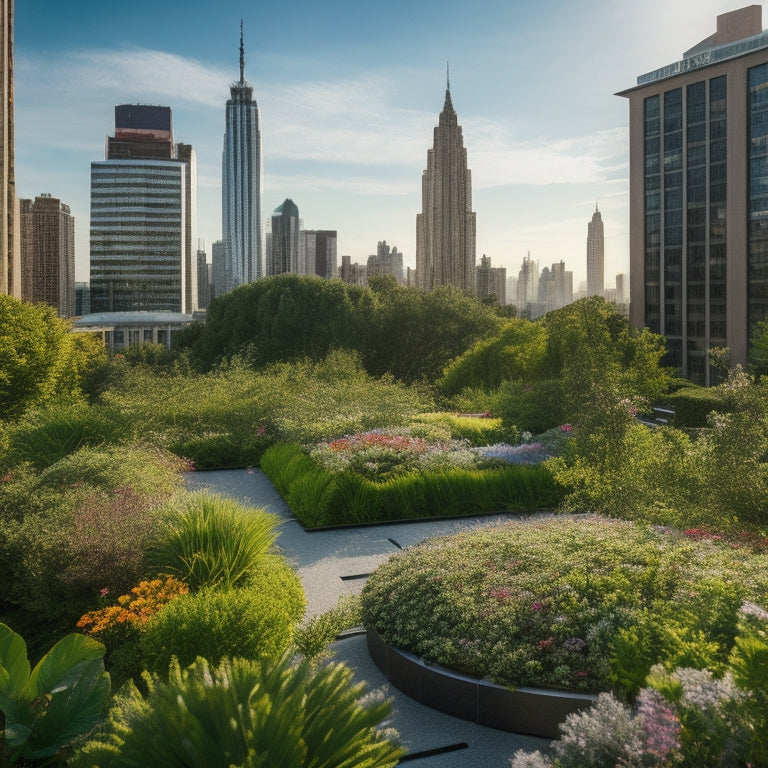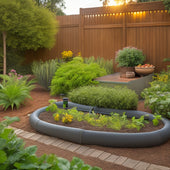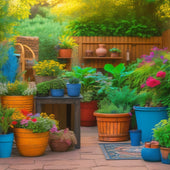
Boost Property Value With Rooftop Gardening Benefits
Share
By incorporating rooftop gardening into your property, you can reveal a significant increase in value, up to 15%, while simultaneously enhancing your quality of life and contributing to a more sustainable urban environment. This boost in value is largely attributed to the enhanced aesthetic appeal, improved air quality, and reduced energy costs that come with rooftop gardening. As you explore the possibilities of rooftop gardening, you'll discover how it can also provide a tranquil oasis, increase rental yields, and even lead to potential tax incentives. Take the next step in transforming your property and revealing its full potential.
Enhanced Aesthetic Appeal Matters
As you plan your rooftop garden, incorporating visually pleasing elements can greatly enhance the aesthetic appeal of your outdoor space, thereby increasing its functionality and overall ambiance. Drawing inspiration from various design styles, such as modern, traditional, or eclectic, can help you create a unique and captivating atmosphere.
Consider adding landscaping ideas like curved pathways, tiered planters, or statement pieces like sculptures or water features to add visual interest.
When selecting plants, opt for a mix of textures, colors, and heights to create depth and dimension. Consider low-maintenance options like succulents, sedums, or grasses that thrive in rooftop conditions. Don't forget to incorporate seasonal plants to ensure year-round visual charm.
Regular pruning, watering, and fertilizing will keep your rooftop garden looking its best. By following these design inspiration and landscaping ideas, you'll be well on your way to creating a stunning rooftop oasis that's both beautiful and functional.
Increased Property Value Potential
By incorporating a rooftop garden into your property, you can enhance boost its resale value, attracting potential buyers who are willing to pay a premium for the unique combination of natural beauty and urban convenience.
Rooftop gardens are a growing trend in landscaping trends, and their appeal is reflected in the market demand. According to recent studies, properties with rooftop gardens can increase in value by up to 15%. This is because they offer a unique selling point, setting your property apart from others in the area.
Here's a breakdown of the potential property value increase:
| Feature | Property Value Increase |
|---|---|
| Rooftop garden with basic landscaping | 5-7% |
| Rooftop garden with advanced landscaping | 10-12% |
| Rooftop garden with luxury features (e.g. outdoor kitchen, fire pit) | 15-18% |
Environmental Benefits Abound Here
As you transform your rooftop into a lush garden, you're not only enhancing the aesthetic appeal of your property, but you're also contributing to a cleaner and healthier environment. By doing so, you're creating a natural air filtration system that absorbs pollutants and releases oxygen, improving the air quality around you.
Additionally, your rooftop garden will act as a natural insulator, reducing the urban heat island effect and keeping your building cooler in the summer and warmer in the winter.
Air Quality Improvement
Your rooftop garden acts as a natural air filter, capturing airborne pollutants and particulate matter, which significantly enhances the air quality around your building. As you gaze out at the lush greenery, remember that it's not just aesthetically pleasing - it's also working hard to purify the air you breathe.
By reducing the concentration of pollutants, your rooftop garden contributes to a healthier indoor environment, which in turn boosts energy efficiency by reducing the need for air conditioning and ventilation systems. This, in turn, can lead to significant cost savings and a reduced carbon footprint.
The mental health benefits of rooftop gardening can't be overstated either. Studies have shown that proximity to green spaces can reduce stress levels, improve mood, and even alleviate symptoms of anxiety and depression. By creating a tranquil oasis on your rooftop, you're not only improving air quality but also cultivating a sense of well-being.
As you tend to your rooftop garden, you're investing in a healthier, happier you - and that's priceless.
Urban Heat Reduction
Rooftop gardens combat the urban heat island effect by providing a cooling oasis, reducing the surface temperature of your building by up to 25 degrees Fahrenheit during hot summer months. This cooling effect not only creates a more comfortable outdoor space but also leads to significant energy savings. By reducing the need for air conditioning, you can cut your energy costs and carbon footprint.
As you step out onto your rooftop garden, you'll notice the immediate impact of the urban heat reduction. The lush vegetation and shaded areas create a microclimate that's up to 9°F cooler than the surrounding urban environment.
Your rooftop garden also becomes a haven for local wildlife, supporting biodiversity and habitat creation. The diverse range of plants and flowers attracts bees, butterflies, and other pollinators, enriching the urban ecosystem. As you tend to your garden, you're not only improving your property's value but also contributing to a healthier, more sustainable environment.
Roof Durability Improvement Factors
As you start on designing and installing a rooftop garden, you'll want to prioritize roof durability to guarantee a long-lasting and thriving green space.
Three key factors contribute to enhancing roof durability when designing and installing a rooftop garden: waterproofing membrane quality, drainage system efficiency, and structural integrity assessment.
Firstly, a high-quality waterproofing membrane is essential to prevent water seepage and damage to the roof's underlying structure. You can opt for advanced waterproofing solutions, such as bituminous or polymeric membranes, which provide superior protection against moisture infiltration. Additionally, consider incorporating insulation options, like foam board or fiberglass, to reduce heat transfer and energy loss.
A well-designed drainage system is also important to prevent water accumulation and erosion. Make sure that your rooftop garden's drainage system is efficient, with a slight slope to facilitate water runoff and a functional gutter system to direct water away from the roof.
Urban Oasis Creation Possibilities
By incorporating a rooftop garden into urban architecture, you can transform concrete jungles into lush retreats, providing inhabitants with a serene escape from the hustle and bustle of city life. This urban oasis creation possibility allows you to craft a personalized relaxation retreat, tailored to your unique needs and tastes.
When designing your rooftop garden, consider the following essential elements:
-
Garden design: Select a layout that maximizes space, incorporating seating areas, walkways, and focal points to create visual interest.
-
Plant selection: Choose a mix of flowering plants, shrubs, and trees that provide year-round color, texture, and fragrance, while also considering factors like wind resistance and sunlight exposure.
-
Lighting and irrigation: Install energy-efficient lighting and irrigation systems that conserve resources while maintaining a lush, verdant atmosphere.
Higher Rental Yield Expectations
Incorporating a rooftop garden into your property can enhance its appeal to potential tenants, leading you to command higher rental yields and outshine competitors in a crowded market. By providing a unique green space, you'll attract tenants who value the benefits of outdoor living, such as reduced stress and improved mental health. This, in turn, can lead to higher rental yields and longer tenancies.
Here's a breakdown of how rooftop gardens can impact rental yields:
| Property Type | Average Rent | Rent with Rooftop Garden | Increase |
|---|---|---|---|
| Studio Apartment | $1,200 | $1,500 | 25% |
| 1-Bedroom Apartment | $1,800 | $2,200 | 22% |
| 2-Bedroom Apartment | $2,500 | $3,000 | 20% |
| 3-Bedroom Apartment | $3,200 | $3,800 | 19% |
| Luxury Penthouse | $5,000 | $6,500 | 30% |
As you can see, incorporating a rooftop garden into your property can result in significant rental yield increases, making it an attractive investment opportunity. By targeting tenants who value green spaces, you can differentiate your property from competitors and reap the rewards of higher rental yields.
Frequently Asked Questions
Can Rooftop Gardens Withstand Extreme Weather Conditions?
You design rooftop gardens to withstand extreme weather conditions by ensuring climate resilience through robust rooftop structures and sustainable materials, minimizing environmental impact while maintaining a thriving ecosystem.
How Much Maintenance Is Required for Rooftop Gardens?
'Are you prepared to commit to regular upkeep? You'll need to establish a watering schedule, choose low-maintenance plants, implement pest control measures, and apply fertilizers regularly to guarantee your rooftop garden thrives.'
Are Rooftop Gardens Suitable for All Types of Buildings?
You'll find rooftop gardens suitable for buildings with structural integrity, ensuring the weight capacity can handle soil, plants, and water. Consider the aesthetic appeal, as urban green spaces blend seamlessly with compatible building designs, elevating their visual charm.
Can Rooftop Gardens Be Used for Recreational Activities?
You'll be surprised to know that 80% of rooftop gardens are used for recreation! You can design yours for community gatherings, yoga sessions, or even a serene escape, incorporating seating areas, walkways, and lush greenery to create a tranquil oasis.
Do Rooftop Gardens Require Special Permits or Licenses?
You'll need to check with local authorities to determine if your rooftop garden requires special permits or licenses, as permit requirements and legalities vary depending on zoning regulations and restrictions in your area.
Related Posts
-

Irrigation Solutions for Raised Bed Planters Made Easy
You can optimize your raised bed planters' irrigation system by understanding the complex interplay between soil type...
-

Irrigation Solutions for Raised Bed Planters Made Easy
You can optimize your raised bed planters' irrigation system by understanding the complex interplay between soil type...
-

Irrigation Solutions for Raised Bed Planters Made Easy
You can optimize your raised bed planters' irrigation system by understanding the complex interplay between soil type...
-

Irrigation Solutions for Raised Bed Planters Made Easy
You can optimize your raised bed planters' irrigation system by understanding the complex interplay between soil type...
-

Irrigation Solutions for Raised Bed Planters Made Easy
You can optimize your raised bed planters' irrigation system by understanding the complex interplay between soil type...
-

Irrigation Solutions for Raised Bed Planters Made Easy
You can optimize your raised bed planters' irrigation system by understanding the complex interplay between soil type...
-

Irrigation Solutions for Raised Bed Planters Made Easy
You can optimize your raised bed planters' irrigation system by understanding the complex interplay between soil type...
-

Irrigation Solutions for Raised Bed Planters Made Easy
You can optimize your raised bed planters' irrigation system by understanding the complex interplay between soil type...
-

Irrigation Solutions for Raised Bed Planters Made Easy
You can optimize your raised bed planters' irrigation system by understanding the complex interplay between soil type...
-

Irrigation Solutions for Raised Bed Planters Made Easy
You can optimize your raised bed planters' irrigation system by understanding the complex interplay between soil type...
-

Irrigation Solutions for Raised Bed Planters Made Easy
You can optimize your raised bed planters' irrigation system by understanding the complex interplay between soil type...
-

Irrigation Solutions for Raised Bed Planters Made Easy
You can optimize your raised bed planters' irrigation system by understanding the complex interplay between soil type...
-

Irrigation Solutions for Raised Bed Planters Made Easy
You can optimize your raised bed planters' irrigation system by understanding the complex interplay between soil type...
-

Irrigation Solutions for Raised Bed Planters Made Easy
You can optimize your raised bed planters' irrigation system by understanding the complex interplay between soil type...
-

Irrigation Solutions for Raised Bed Planters Made Easy
You can optimize your raised bed planters' irrigation system by understanding the complex interplay between soil type...
-

Irrigation Solutions for Raised Bed Planters Made Easy
You can optimize your raised bed planters' irrigation system by understanding the complex interplay between soil type...
-

Irrigation Solutions for Raised Bed Planters Made Easy
You can optimize your raised bed planters' irrigation system by understanding the complex interplay between soil type...
-

Irrigation Solutions for Raised Bed Planters Made Easy
You can optimize your raised bed planters' irrigation system by understanding the complex interplay between soil type...
-

Irrigation Solutions for Raised Bed Planters Made Easy
You can optimize your raised bed planters' irrigation system by understanding the complex interplay between soil type...
-

Irrigation Solutions for Raised Bed Planters Made Easy
You can optimize your raised bed planters' irrigation system by understanding the complex interplay between soil type...
-

Irrigation Solutions for Raised Bed Planters Made Easy
You can optimize your raised bed planters' irrigation system by understanding the complex interplay between soil type...
-

Irrigation Solutions for Raised Bed Planters Made Easy
You can optimize your raised bed planters' irrigation system by understanding the complex interplay between soil type...
-

Irrigation Solutions for Raised Bed Planters Made Easy
You can optimize your raised bed planters' irrigation system by understanding the complex interplay between soil type...
-

Irrigation Solutions for Raised Bed Planters Made Easy
You can optimize your raised bed planters' irrigation system by understanding the complex interplay between soil type...
-

Irrigation Solutions for Raised Bed Planters Made Easy
You can optimize your raised bed planters' irrigation system by understanding the complex interplay between soil type...
-

Irrigation Solutions for Raised Bed Planters Made Easy
You can optimize your raised bed planters' irrigation system by understanding the complex interplay between soil type...
-

Irrigation Solutions for Raised Bed Planters Made Easy
You can optimize your raised bed planters' irrigation system by understanding the complex interplay between soil type...
-

Irrigation Solutions for Raised Bed Planters Made Easy
You can optimize your raised bed planters' irrigation system by understanding the complex interplay between soil type...
-

3 Best DIY Planter Ideas for Backyard Decor
You can elevate your backyard's style and functionality by choosing the right DIY planter ideas. Start with a mix of ...
-

3 Best DIY Planter Ideas for Backyard Decor
You can elevate your backyard's style and functionality by choosing the right DIY planter ideas. Start with a mix of ...
-

3 Best DIY Planter Ideas for Backyard Decor
You can elevate your backyard's style and functionality by choosing the right DIY planter ideas. Start with a mix of ...
-

3 Best DIY Planter Ideas for Backyard Decor
You can elevate your backyard's style and functionality by choosing the right DIY planter ideas. Start with a mix of ...
-

3 Best DIY Planter Ideas for Backyard Decor
You can elevate your backyard's style and functionality by choosing the right DIY planter ideas. Start with a mix of ...
-

3 Best DIY Planter Ideas for Backyard Decor
You can elevate your backyard's style and functionality by choosing the right DIY planter ideas. Start with a mix of ...
-

3 Best DIY Planter Ideas for Backyard Decor
You can elevate your backyard's style and functionality by choosing the right DIY planter ideas. Start with a mix of ...
-

3 Best DIY Planter Ideas for Backyard Decor
You can elevate your backyard's style and functionality by choosing the right DIY planter ideas. Start with a mix of ...
-

3 Best DIY Planter Ideas for Backyard Decor
You can elevate your backyard's style and functionality by choosing the right DIY planter ideas. Start with a mix of ...
-

3 Best DIY Planter Ideas for Backyard Decor
You can elevate your backyard's style and functionality by choosing the right DIY planter ideas. Start with a mix of ...
-

3 Best DIY Planter Ideas for Backyard Decor
You can elevate your backyard's style and functionality by choosing the right DIY planter ideas. Start with a mix of ...
-

3 Best DIY Planter Ideas for Backyard Decor
You can elevate your backyard's style and functionality by choosing the right DIY planter ideas. Start with a mix of ...
-

3 Best DIY Planter Ideas for Backyard Decor
You can elevate your backyard's style and functionality by choosing the right DIY planter ideas. Start with a mix of ...
-

3 Best DIY Planter Ideas for Backyard Decor
You can elevate your backyard's style and functionality by choosing the right DIY planter ideas. Start with a mix of ...
-

Accurate Measuring for DIY Block Planters Made Easy
As you begin building a DIY block planter, precise measurement is essential for a sturdy structure that can support s...
-

Accurate Measuring for DIY Block Planters Made Easy
As you begin building a DIY block planter, precise measurement is essential for a sturdy structure that can support s...
-

Accurate Measuring for DIY Block Planters Made Easy
As you begin building a DIY block planter, precise measurement is essential for a sturdy structure that can support s...
-

Accurate Measuring for DIY Block Planters Made Easy
As you begin building a DIY block planter, precise measurement is essential for a sturdy structure that can support s...
-

Accurate Measuring for DIY Block Planters Made Easy
As you begin building a DIY block planter, precise measurement is essential for a sturdy structure that can support s...
-

Accurate Measuring for DIY Block Planters Made Easy
As you begin building a DIY block planter, precise measurement is essential for a sturdy structure that can support s...
-

Accurate Measuring for DIY Block Planters Made Easy
As you begin building a DIY block planter, precise measurement is essential for a sturdy structure that can support s...
-

Accurate Measuring for DIY Block Planters Made Easy
As you begin building a DIY block planter, precise measurement is essential for a sturdy structure that can support s...
-

Accurate Measuring for DIY Block Planters Made Easy
As you begin building a DIY block planter, precise measurement is essential for a sturdy structure that can support s...
-

Accurate Measuring for DIY Block Planters Made Easy
As you begin building a DIY block planter, precise measurement is essential for a sturdy structure that can support s...
-

Accurate Measuring for DIY Block Planters Made Easy
As you begin building a DIY block planter, precise measurement is essential for a sturdy structure that can support s...
-

Accurate Measuring for DIY Block Planters Made Easy
As you begin building a DIY block planter, precise measurement is essential for a sturdy structure that can support s...
-

Accurate Measuring for DIY Block Planters Made Easy
As you begin building a DIY block planter, precise measurement is essential for a sturdy structure that can support s...
-

Accurate Measuring for DIY Block Planters Made Easy
As you begin building a DIY block planter, precise measurement is essential for a sturdy structure that can support s...
-

Accurate Measuring for DIY Block Planters Made Easy
As you begin building a DIY block planter, precise measurement is essential for a sturdy structure that can support s...
-

Accurate Measuring for DIY Block Planters Made Easy
As you begin building a DIY block planter, precise measurement is essential for a sturdy structure that can support s...
-

Accurate Measuring for DIY Block Planters Made Easy
As you begin building a DIY block planter, precise measurement is essential for a sturdy structure that can support s...
-

Accurate Measuring for DIY Block Planters Made Easy
As you begin building a DIY block planter, precise measurement is essential for a sturdy structure that can support s...
-

Accurate Measuring for DIY Block Planters Made Easy
As you begin building a DIY block planter, precise measurement is essential for a sturdy structure that can support s...
-

Accurate Measuring for DIY Block Planters Made Easy
As you begin building a DIY block planter, precise measurement is essential for a sturdy structure that can support s...
-

Accurate Measuring for DIY Block Planters Made Easy
As you begin building a DIY block planter, precise measurement is essential for a sturdy structure that can support s...
-

Accurate Measuring for DIY Block Planters Made Easy
As you begin building a DIY block planter, precise measurement is essential for a sturdy structure that can support s...
-

Accurate Measuring for DIY Block Planters Made Easy
As you begin building a DIY block planter, precise measurement is essential for a sturdy structure that can support s...
-

Accurate Measuring for DIY Block Planters Made Easy
As you begin building a DIY block planter, precise measurement is essential for a sturdy structure that can support s...
-

Accurate Measuring for DIY Block Planters Made Easy
As you begin building a DIY block planter, precise measurement is essential for a sturdy structure that can support s...
-

Accurate Measuring for DIY Block Planters Made Easy
As you begin building a DIY block planter, precise measurement is essential for a sturdy structure that can support s...
-

Accurate Measuring for DIY Block Planters Made Easy
As you begin building a DIY block planter, precise measurement is essential for a sturdy structure that can support s...


